Karin Kohlenstein Hurt (’89) was practicing leadership skills, first as a student and then as a corporate executive, long before starting her own consulting firm in 2013. Now, she and her husband, David Dye, have co-authored several bestselling books on leadership, worked with clients on every continent except Antarctica and are in demand on the speaker circuit.
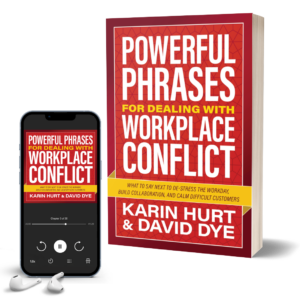
Top, Karin Kohlenstein Hurt (’89) and her husband, David Dye, in Cambodia, where they have helped get more than 150 wells built. Above, the couple recently published their fifth book. Photos courtesy of Hurt
And her firm has found a way to honor clients by sponsoring wells in Cambodia.
Her passion for leadership goes back to her time at Wake Forest, where Hurt earned an undergraduate degree in speech communication with honors and a minor in English, followed by a master’s degree in organizational communication from Towson University and doctoral work at the University of Maryland. She then rose through the ranks at Verizon Wireless to executive director for national operations of a strategic partnership channel before leaving to start her own firm in Laurel, Maryland, near Washington.
She collaborated with Dye, also a consultant-author, on her second book and soon after, they married and merged their businesses. Hurt is the combined firm’s CEO; Dye is president. They just finished their fifth jointly written book, “Powerful Phrases for Dealing with Workplace Conflict: What to Say Next to De-Stress the Workday, Build Collaboration, and Calm Difficult Customers,” to provide ways to start productive conversations.
Wake Forest Magazine Managing Editor Kelly Greene (’91) recently spoke with Hurt to find out what we can learn from her research — and her philanthropic work in Southeast Asia. Here are excerpts from their conversation, edited for length and clarity.
Kelly Greene: Karin, thank you so much for making time to share your story. What did you learn about leadership at Wake Forest that has stuck with you?
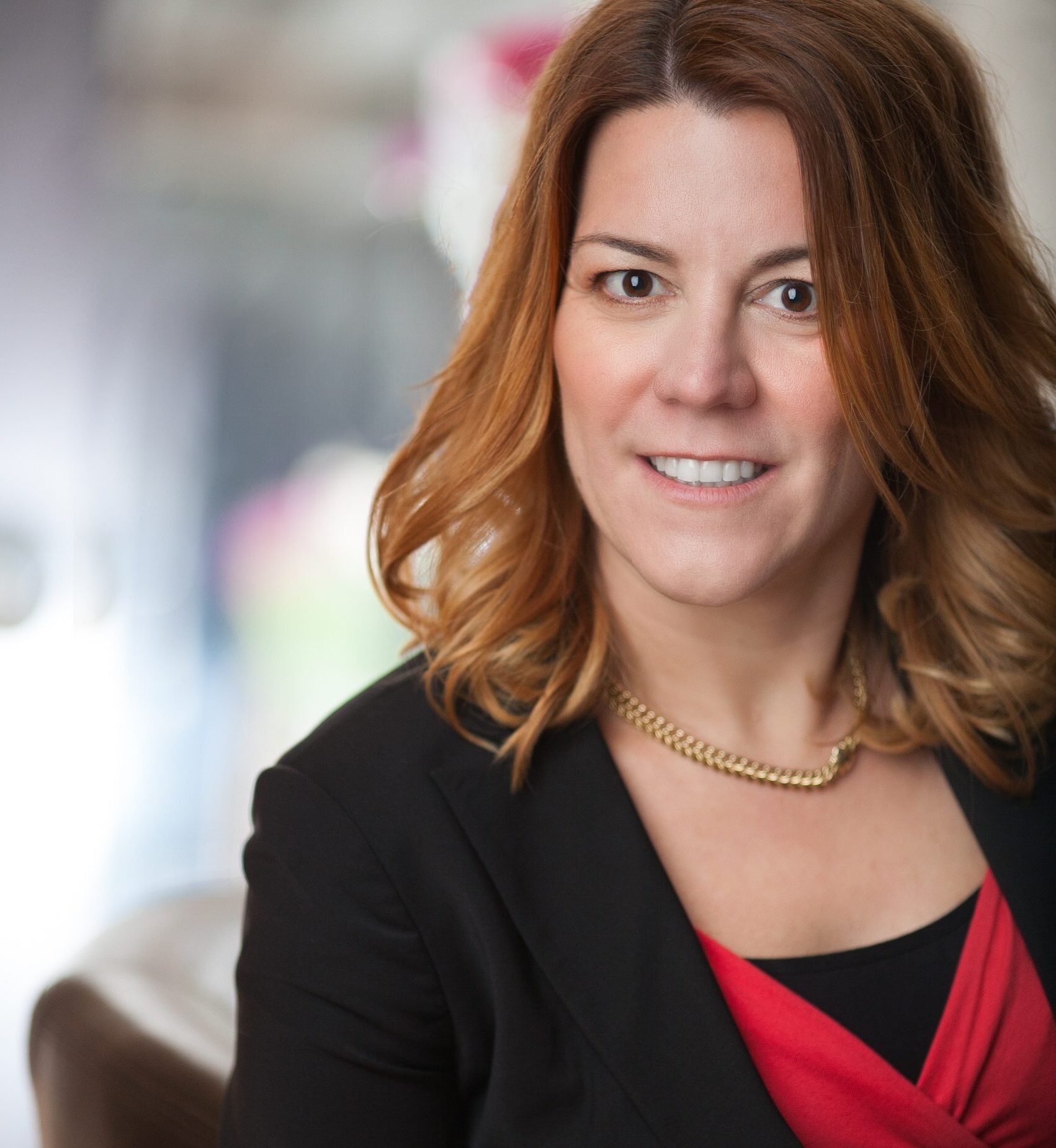
Karin Kohlenstein Hurt (’89), CEO of Let’s Grow Leaders, a company that grew from her blog
Karin Kohlenstein Hurt: When I think about my time at Wake Forest, I had an unbelievable opportunity to lead (as a society president). We would have 100 people at Thymes meetings. There’s administration: How are we going to run the meetings? How are we going to do pledge night? We had challenges: We forgot to get the liquor permit, so we had to knock on (then Associate Dean of Students) Mike Ford’s (’72) door and tell him we screwed up and ask him to please, please let us have this permit — which he did. Or you have a member who is struggling with a drug abuse issue who you want to get the support they need while maintaining their privacy. It taught me a lot, including how to not take credit for things I didn’t do. The mistakes that I made at Wake Forest made a big impact on how I have led.
KG: Tell us about your life after Wake Forest and how you wound up managing thousands of people?
KH: There were two really pivotal moments. One was I was working on a Ph.D. at the University of Maryland, studying organizational communication. I was reading about self-directed teams, and in the back of these articles in journals in the library, I kept seeing this guy’s name, Dr. Henry Sims. I looked him up and realized he was a professor at the University of Maryland but in the business school. I literally ran across campus and knocked on his door and said, “I can’t believe this. I’ve been reading about you, and you’re here.” We talked for two hours, and he told me I didn’t need a Ph.D. to work in a big organization — I needed a contact. He took me to lunch with a former student who was working at Bell Atlantic (now Verizon), and she hired me to be an intern while I was working on my Ph.D. But then she offered me a full-time dream job building self-directed work teams, which was exactly what I was studying. So, I left, and the rest is history.
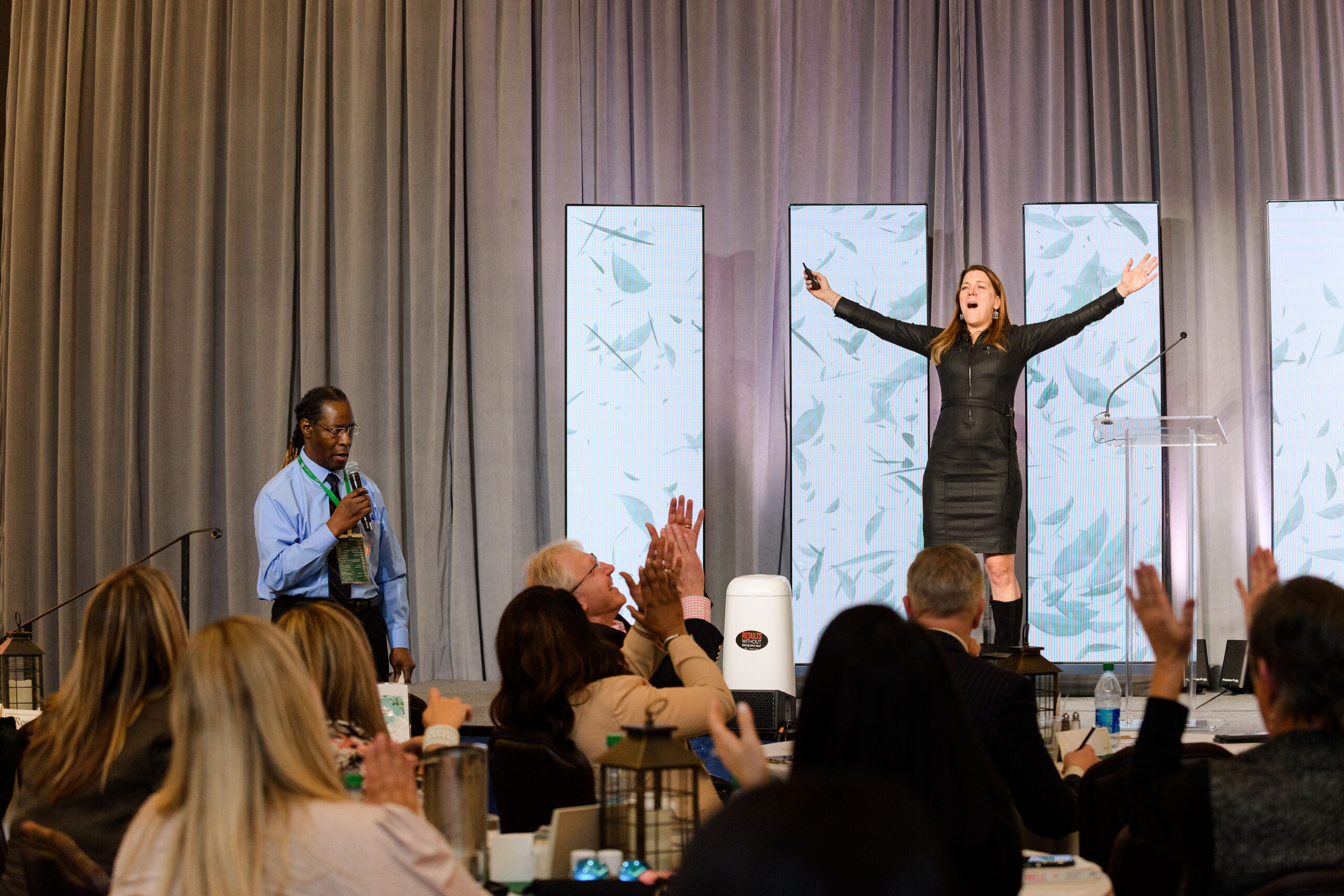
Hurt is a popular keynote speaker and leadership consultant who has worked with clients on every continent except Antarctica.
KG: What was the other moment?
KH: I had been in (human resources) for a decade, and I was working on a merger integration project with a senior leader in customer service. He took me aside and asked me what I wanted to do next. I said I would probably be a VP of HR. He said, “That’s the obvious path for you, but you’ve studied leadership, you teach leadership, you run mentoring programs, all this stuff. What’s the largest team you’ve ever led?” And I said, “30.” He said I’d have more credibility with him if I’d led a team of a thousand, so he suggested that I should run the call centers. Six months later, I was firing someone who ran multiple call centers for ethical reasons, and I asked the VP of customer service who her backfill would be. She said, “It’s going to be you.” So, I took them over — with no call-center experience.
It gave me the confidence that I could do big jobs, so then I moved into retail sales and had 110 Verizon stores and 2,200 people. I’d never sold a thing in my life except Girl Scout cookies, and I had to figure it out. I found I was really good at establishing an audacious vision and rallying a team toward that vision. Then I had to put people on my team who were really good at operations because I hated the logistics of stuff. Now, that’s what I teach organizations — how to build great cultures, how to assemble great teams, how to build habits that will lead to success.
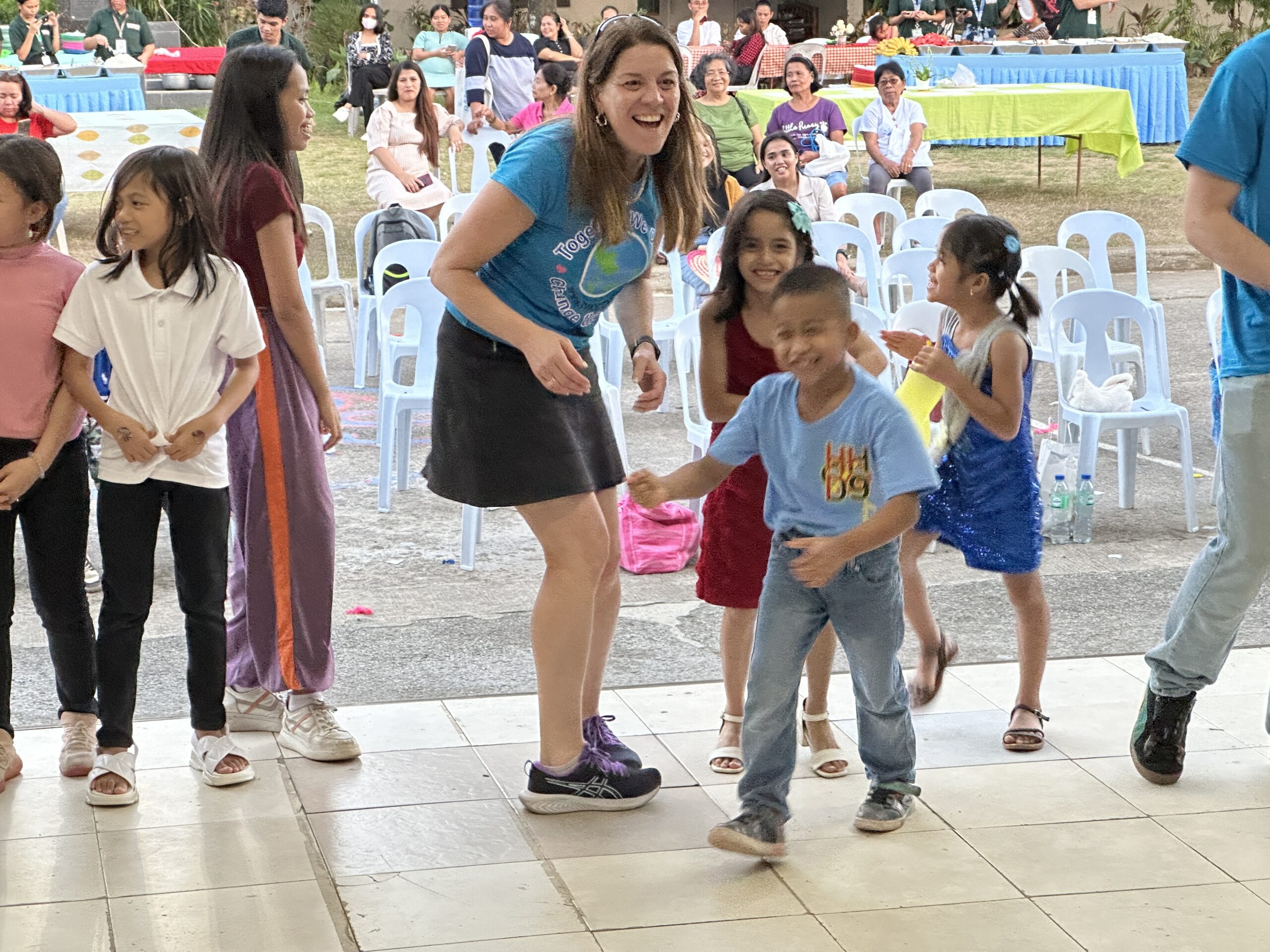
Hurt visiting with children during a Southeast Asian speaking tour
KG: How did you make the leap from leading a huge corporate team to going it alone?
KH: When I was running Verizon’s call centers, they were outsourced, and I was trying to change a bunch of cultures that weren’t ours. I started writing this blog in 2012 to figure out how you make this stuff super practical for people who don’t have all the fancy leadership training that a big company provides. People just started reading the blog, which I called “Let’s Grow Leaders,” and then they started calling and asking if I could be their keynote speaker, and my blog became this company.
It was not anywhere as easy as I thought it would be. I had set aside money and said that when it ran out, I would have to go get a job. I had to build a website, marketing, all the things it takes to run a company. I came within $10,000 of running out. I spoke for free a good bit just to build a speaking reel, and I was very clear about who I wanted to work with. If someone just wanted to do leadership training to check a box, I didn’t want to work with them. Or if a CEO wanted me to come in and fix their team but didn’t want me to work with them, I would say, “You have to (let me work with you) first, or you’re wasting your money.” People felt that I was serious about the impact that the training or culture-change initiative would have, and that reputation began to build over time.
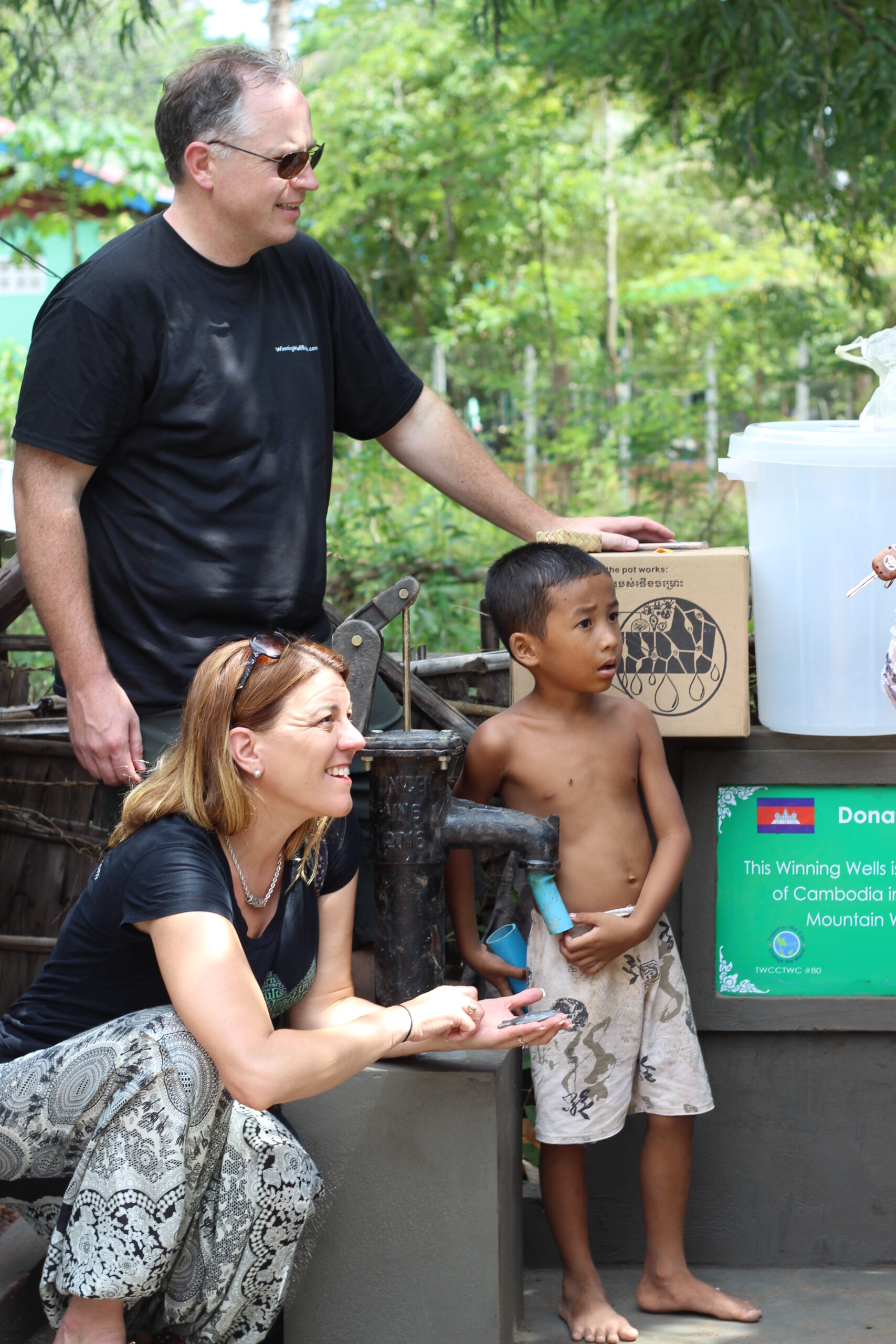
Dye and Hurt visiting a well site in Cambodia
KG: Why did you start writing books — and how did your husband become your co-author?
KH: I wrote and self-published my very first book, “Overcoming an Imperfect Boss: A Practical Guide to Building a Better Relationship With Your Boss,” as I was leaving Verizon. But then David and I were both blogging, and we both wound up at a conference in New York to find a publisher. We got to talking and found out we were pretty much writing the same book — on practical tools and techniques for getting results and staying a decent human being. So, we decided to collaborate, and we wrote this entire book together (“Winning Well: A Manager’s Guide to Getting Results — Without Losing Your Soul”) while he’s living in Colorado, and I’m in Maryland. We did the whole thing over FaceTime, including falling in love. In the end, we got married and merged our businesses together.
KG: And that book also led to your “Winning Wells” work?
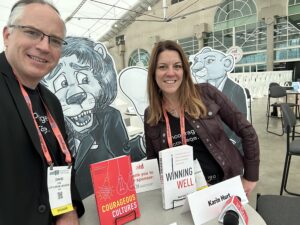
Dye and Hurt with books they wrote together
KH: At a speakers’ conference, we met Scott Friedman, who runs this nonprofit, Together We Can Change the World. He takes speakers overseas, and the money from their speaking engagements is used to do things like build computer labs and clean water wells. I just looked at David and said, “Winning Wells,” and he said, “Right, we’ve got to do that.” So now, when a client books us for a keynote or leadership program, we build a well in Cambodia in their name. We’re at over 150 wells now, and we’ve been doing it since 2016 or 2017.
People are so spread out (in Cambodia). Sometimes a well will only serve a single family, but sometimes it will serve a day care center or a school. We went to visit some of the wells, and we had to go on an ox cart. Those wells do more than provide water — they make a big impact on lives. People get back time they spent walking for water. They can plant lemon trees and mango trees and sell the fruit, then buy chickens and sell the eggs. And these little fish are added to the water to provide nutrients, so the kids are healthier.
KG: You and David just published a new book, “Powerful Phrases for Dealing with Workplace Conflict.” How can we do a better job working out our differences?
KH: We have found that the biggest problem is people are unwilling to have the conversation. But nothing gets better if you avoid conflict. So, we wrote the book to give people the courage and competence to have difficult conversations. We give you 300 questions and phrases to use in those situations: Somebody stole your idea, somebody’s gossiping about you, your boss is a micromanager, you’re working in a matrixed organization. Nobody’s going to remember 300 phrases, so we have one page with 12 (greatest of all time) ones that we know from research work across cultures.
For example, to get clarity, you could ask, “What would a successful outcome do for you?” It’s actually quite different from just asking what success would look like, because it gets at your motivation.
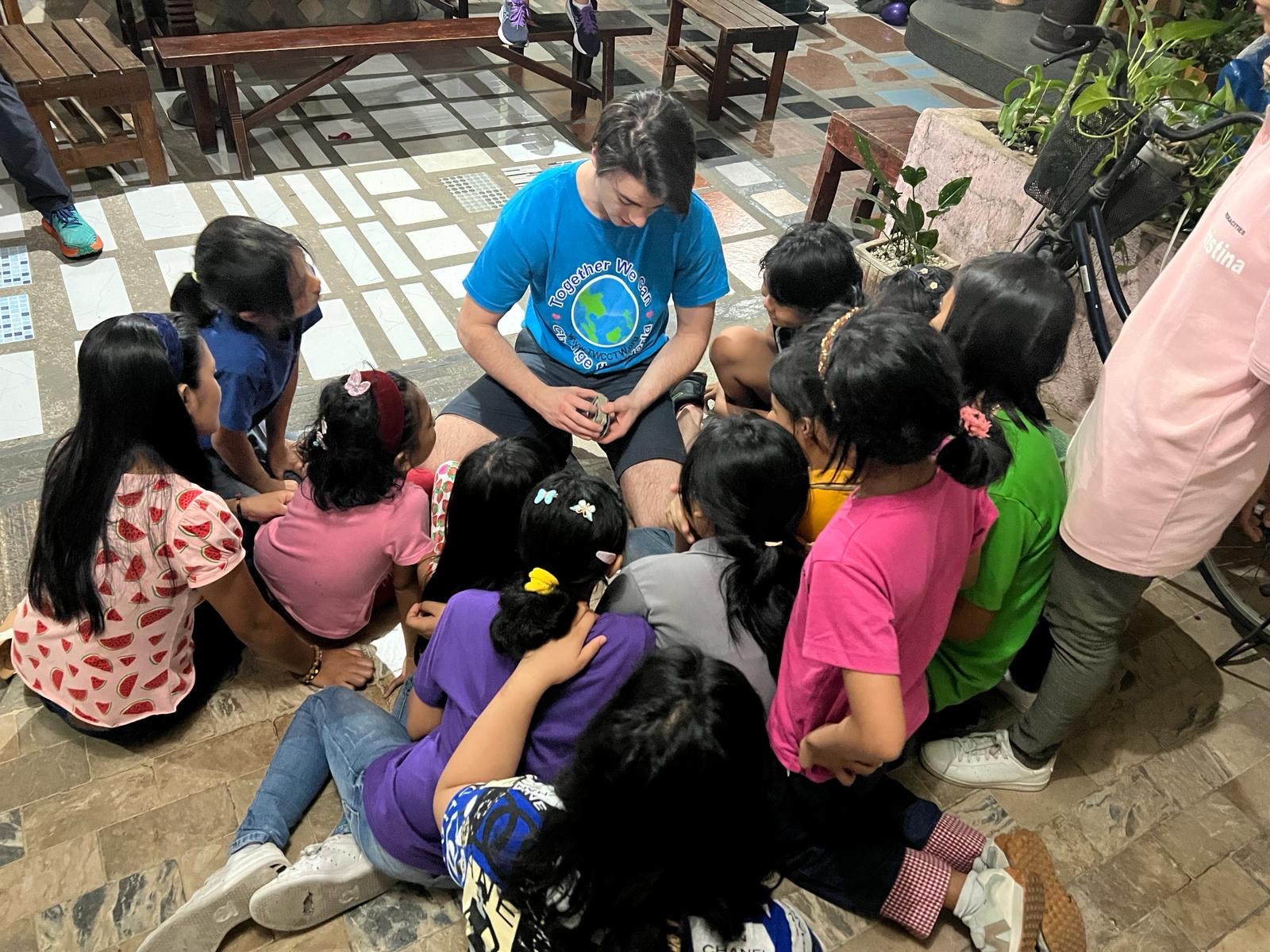
Hurt's son joined her on a speaking tour that included working with children.
KG: It was fun to see a shoutout in your book to another Wake Forest alumna and member of the board of trustees, Marybeth Torbet Hays (’90, MBA ’94).
KH: The last time Marybeth and I collaborated was probably on a letter to the editor (in the Old Gold & Black). Marybeth is a former executive vice president at Walmart, so she has great insight. She shared an example of a phrase that’s direct, professional and kind: “This could be a career derailer for you.” She considers it especially useful in conversations with otherwise strong performers who have style or interpersonal issues.
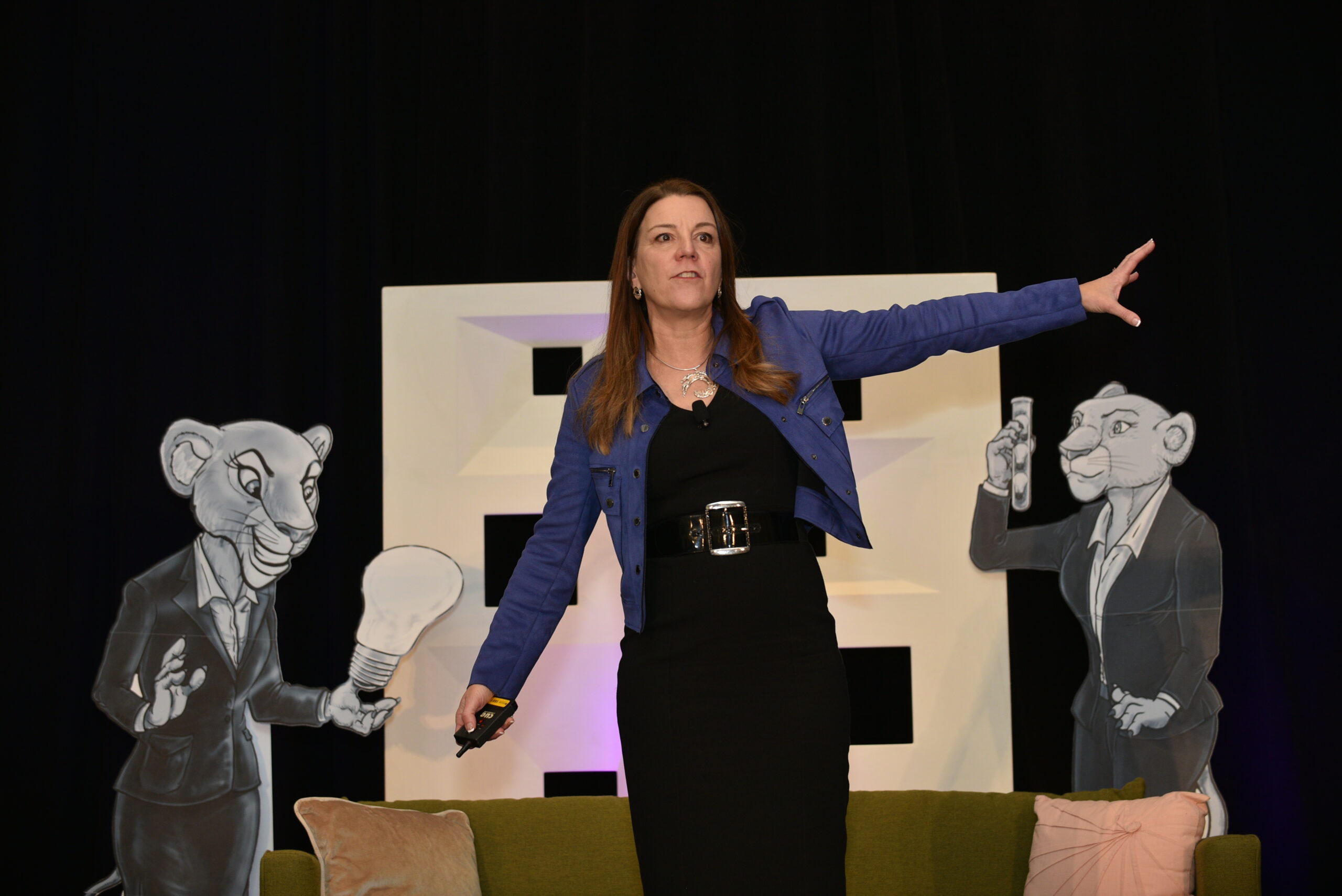
Hurt in action
KG: What would you tell new graduates about leadership?
KH: Own your strengths, have the confidence to speak the truth and to stand up for what matters and the humility to show up and be curious, recognizing that you don’t know all the answers. Surround yourself with people who will challenge you and tell you the truth. And admit when you’re wrong. Focus on results and relationships — setting clear expectations, holding people accountable to those expectations, but also developing the relationships and fostering collaboration and getting to know one another as human beings. You can’t always choose what you show up to, but you can always choose how you show up. And if you can just stop before you do something and ask, “How do I show up in this moment with confidence and humility, focused on results and relationships?” you’ll always get to the right answer.


